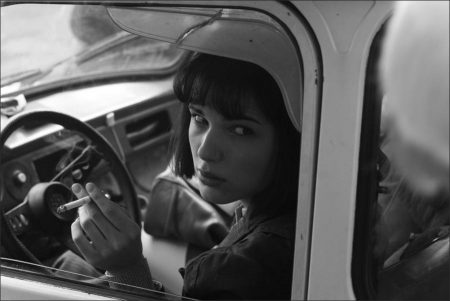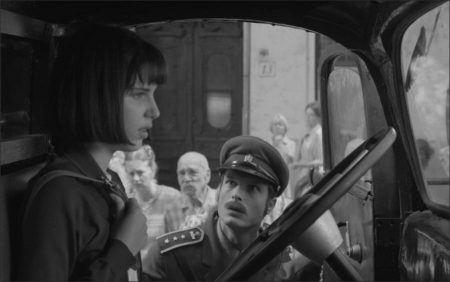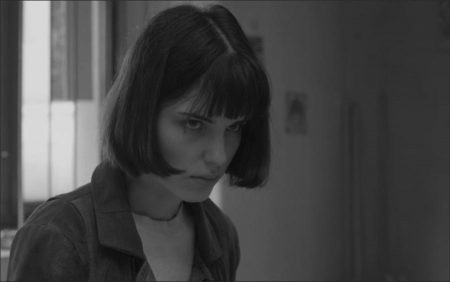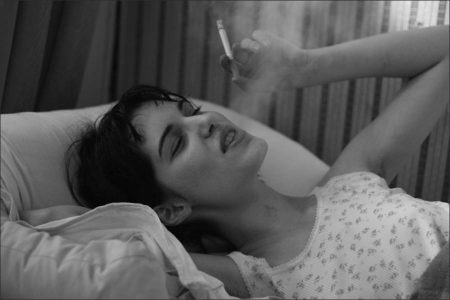
Michalina Olszanska
“My verdict is: I, Olga Hepnarová, the victim of your bestiality, sentence you to death penalty.” Those were the famous words of the 22-year-old mass murderer Olga Hepnarová, who in 1973 drove a truck into a group of innocent people in Prague.
Raised in Prague, Olga Hepnarová was a timid by nature and troubled child with no friends, that was frequently bullied by her classmates. Living in a strict family environment, feeling alone and unable to cope with life’s issues, she gradually alienated herself. Unable to fit in, she felt a raging hatred growing inside her towards the indifference of a society that left her destroyed by people. Rejected by everyone and marginalised, she meticulously plotted against society, declaring her intention for revenge against her family and the world…
I, Olga Hepnarová (Czech: Já, Olga Hepnarová) is a 2016 internationally co-produced drama film, directed by Tomáš Weinreb and Petr Kazda, about Olga Hepnarová (1951–1975). She was a Czechoslovakian mass murderer, who on 10 July, 1973, killed eight people with a truck in Prague. The film was shown in the Panorama section at the 66th Berlin International Film Festival.

Michalina Olszanska
Film Review for I, Olga Hepranova
Freshmen Tomas Weinreb and Petr Kazda helm a steady, solemn biopic of the last woman sentenced to death in Czechoslovakia.
“To commit suicide you need a strong will, something you certainly don’t have,” the true-life title character of “I, Olga Hepnarova” is told by her mother at the outset of this fearsomely tough-minded biopic. By the time her 22-year-old daughter consciously mowed down eight strangers on a Prague sidewalk in 1973, seeking the death sentence in her guilty plea, Mrs. Hepnarova was proven only half right.
Teasing out the psychological roots of a stunning crime with heavily measured, methodical patience, writer-directors Tomas Weinreb and Petr Kazda construct a still-topical case study of extreme trauma yielded by adolescent bullying and parental neglect, fronted with committed intensity by rising Polish star Michalina Olszanska. A distinctly gloomy choice of curtain raiser for this year’s Berlinale Panorama program, the film can strain a little for its severity, but intelligently dodges sensationalism throughout.
The film’s sensitive handling of Hepnarova’s frustrated homosexuality will earn Weinreb and Kazda’s joint debut feature additional exposure on the LGBT festival circuit. Even with that niche in mind, however, it’s hard to see many distributors stumping up for a film that makes fellow murderess biopics “Monster” and “Dance With a Stranger” look positively life-affirming by comparison. Unforgivingly rigorous to its final, exactingly composed monochrome frame, “I, Olga Hepnarova” shows us scarcely a flickering moment of light or joy in its anti-heroine’s short, loveless life, depicted on screen from adolescence upwards.

Michalina Olszanska
In a confessional letter Hepnarova mailed to newspapers before committing mass murder — incorporated verbatim into Weinreb and Kazda’s screenplay — she describes herself as “a wreck, ruined by people,” cataloguing her extensive history of violent mistreatment at the hands of her peers, parents and teachers. (Some of the more heated content in her statements — as when she describes her position as “worse than that of a black American” — will further cause auds and distribs to wince; “verbatim” is a crucial word in this instance, with the documentary-trained helmers loath to soften their protagonist for the purposes of narrative sympathy.)
The film pre-emptively unfolds as a dramatic substantiation of this testimony. Beginning with Hepnarova’s failed attempt to overdose on meprobamate at the tender age of 13, it unflinchingly observes the alleged suffering she subsequently endured — from savage shower-room beatings in the girls’ mental hospital to which she was confined for a stretch, to more tacit insinuations of sexual abuse at home. (In one disconcerting scene, d.p. Adam Sikora’s camera hovers in an empty hallway for 45 silent seconds before Hepnarova’s father leaves the room she just entered.)
There are no title cards to shape or separate the film’s early chronology as young Olga grows to adulthood, while 23-year-old Olszanska (who also recently impressed in Sundance mermaid fantasy “The Lure”) plays her continuously — and convincingly, with only a shift in hairstyle to a raggedy dark bob marking her coming of age. It’s an effective strategy, appropriately blurring Hepnarova’s childhood as a kind of indefinite hell; as an adult, on the other hand, she still seems insecurely stuck in transitional limbo.

Michalina Olszanska
After leaving her middle-class home, Hepnarova drifts between jobs, finding tomboyish employment as a truck driver and eventually, cautiously, coming out as a lesbian — though while we’re party to a few of her same-sex dalliances, she maintains that she’s a “sexual cripple.” The film’s depiction of her older years lacks the harsh, visceral impact of its earlier scenes, prolonging and repeating its emotional beats to convey her growing alienation from polite society, and rather too vaguely sketching a rare friendship with older man Miroslav (Martin Pechlat, providing the pic’s few notes of warmth).
The completed portrait feels somewhat lengthy even at 104 minutes, though her climactic crime — driving her truck down a crowded city sidewalk, bodies crumpling in her path — is shown with matter-of-fact economy; the psychological switchbacks of her trial and conviction, meanwhile, are horribly compelling. If the character’s awkward physicality is a little forced at points, Olszanska remains a magnetizing presence even through the film’s less urgent stretches.
Weinreb and Kazda, for their part, sometimes seem overly enamored of their film’s formal sobriety, with a pronounced taste for painstakingly held static shots and sonic minimalism — though their understatement also has promising rewards, as in a perfectly pitched final tableau of agonized domestic stability in the wake of tragedy.
There’s sound judgment, too, in their and Sikora’s decision to deploy black-and-white lensing not for high-contrast, noir-tinged atmospherics, but instead a lighter, newsprint-like journalistic neutrality. Further below-the-line kudos are owed to production designer Alexandr Kozak, who re-creates the dusty, predated-in-period effect of Soviet-era interiors and vehicles with wholly nostalgia-free authenticity.
I, Olga Hepnarova (2017)
Directed by: Petr Kazda, Tomás Weinreb
Starring: Michalina Olszanska, Martin Pechlát, Klára Melísková, Marika Soposká, Juraj Nvota, Martin Finger, Marta Mazurek, Petra Nesvacilová
Screenplay by: Tomás Weinreb
Cinematography by: Adam Sikora
Film Editing by: Vojtech Fric
Costume Design by: Aneta Grnáková
Art Direction by: Alexandr Kozák
Distributed by: Bontonfilm
Release Date: March 24, 2017



